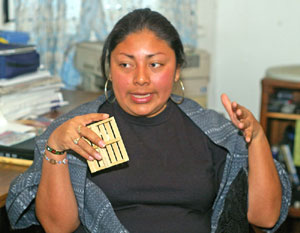

Vol. 72/No. 7 February 18, 2008

|
| Militant/Martha Contreras |
| Flor Crisóstomo, a factory worker in Chicago fighting against her deportation. |
Immigration and Customs Enforcement (ICE) denied her appeal of a deportation order and instructed her to appear with a suitcase of no more than 40 pounds and an airline ticket ready for deportation. “At that moment,” recalls Crisóstomo, “I said I’m not leaving. I asked my pastor and my church for sanctuary and they gave it to me.”
Interviewed at the church, she says she is striving to be seen “not as a symbol of fear, but rather as a symbol of the need to struggle.” Crisóstomo, who is now classified by authorities as a “fugitive from justice,” says what matters most is winning “legalization for all, because that way we win the right to wage increases, to form unions, to receive medical care, to get education.”
Crisóstomo, 28, was one of the two women arrested in the 2006 nationwide ICE raid at 40 IFCO Systems plants. The company manufactures pallets. More than 1,100 workers were taken into custody. Crisótomo was released after 30 hours thanks to protests here.
Six of the 38 workers employed at her plant participated in the March 10, 2006, march for legalization in Chicago. “The boss didn’t give us permission, but we went anyway,” she says.
Leading up to the May 1 demonstration for legalization that year, the 38 workers united and went to the boss together to request time off. Confronted with this he felt he had no choice but to grant it, but asked that they work half a day. They agreed and during their breaks made signs and marched out together at lunch time. The placards demanded legalization now and recognition that they are workers, not criminals.
Crisóstomo came to this country in 2000 in order to get a job that would allow her to support her three children in Mexico. The North American Free Trade Agreement (NAFTA), she maintains, is the cause of the current wave of immigration. Adopted in 1994, NAFTA lifted trade barriers between Mexico, the United States, and Canada. Crisóstomo’s family lost a restaurant along the highway once freeways were built to allow more direct access to the U.S. market. “That was the end of many small businesses, and today many villages have become ghost towns,” she says.
“NAFTA made it impossible for me to feed my children in my home town. The situation has gotten worse,” she explains. On January 1, as part of the NAFTA agreement, the Mexican government ended tariffs on corn and other products imported from north of the border, meaning that many Mexican farmers will be priced out of the market by cheaper U.S. goods. “With the final elimination of the tariffs on corn, food, sugar, and powdered milk perhaps a million more Mexican farmers will cross the border to find work in this country,” Crisóstomo thinks. The U.S. government “can build a [border] wall to the heavens but they can’t stop people from crossing to feed their families.”
She urges a big turnout for the May Day demonstrations this year for immigrant rights: “May First should continue to be the working class’s holiday. We’re already organizing to march in Chicago.”
Related articles:
Workers condemn anti-immigrant raids in Tennessee
Front page (for this issue) |
Home |
Text-version home